Top 10 Email Ticket Systems Compared for 2025
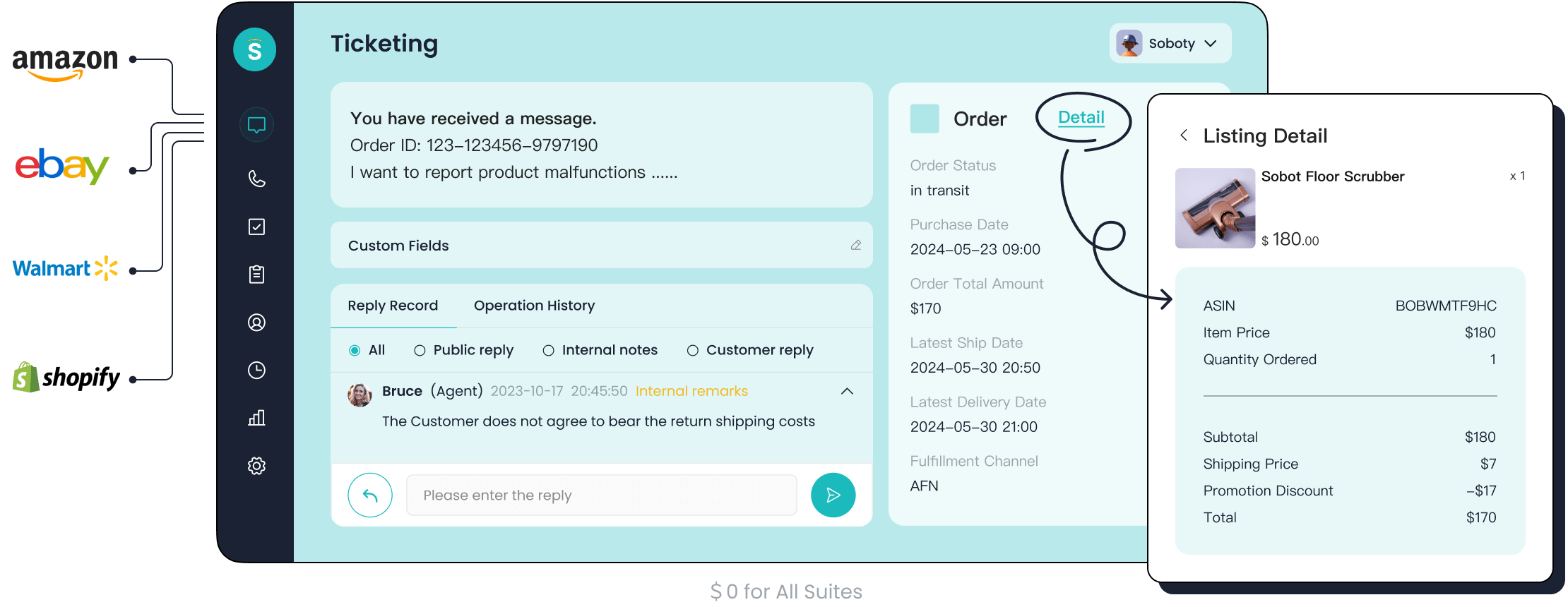
An email ticket system transforms how you handle customer support by organizing inquiries into manageable tickets. This tool ensures seamless customer service management, improving both efficiency and satisfaction. A well-designed system lets you track, prioritize, and resolve tickets, enhancing the customer experience. By integrating features like a self-service portal and helpdesk capabilities, it empowers users to find solutions independently. Businesses like Sobot demonstrate the benefits of these systems by offering unified platforms that streamline operations. Adopting such solutions not only simplifies workflows but also boosts satisfaction for both customers and teams.
Comparison Table of the Top 10 Email Ticket Systems
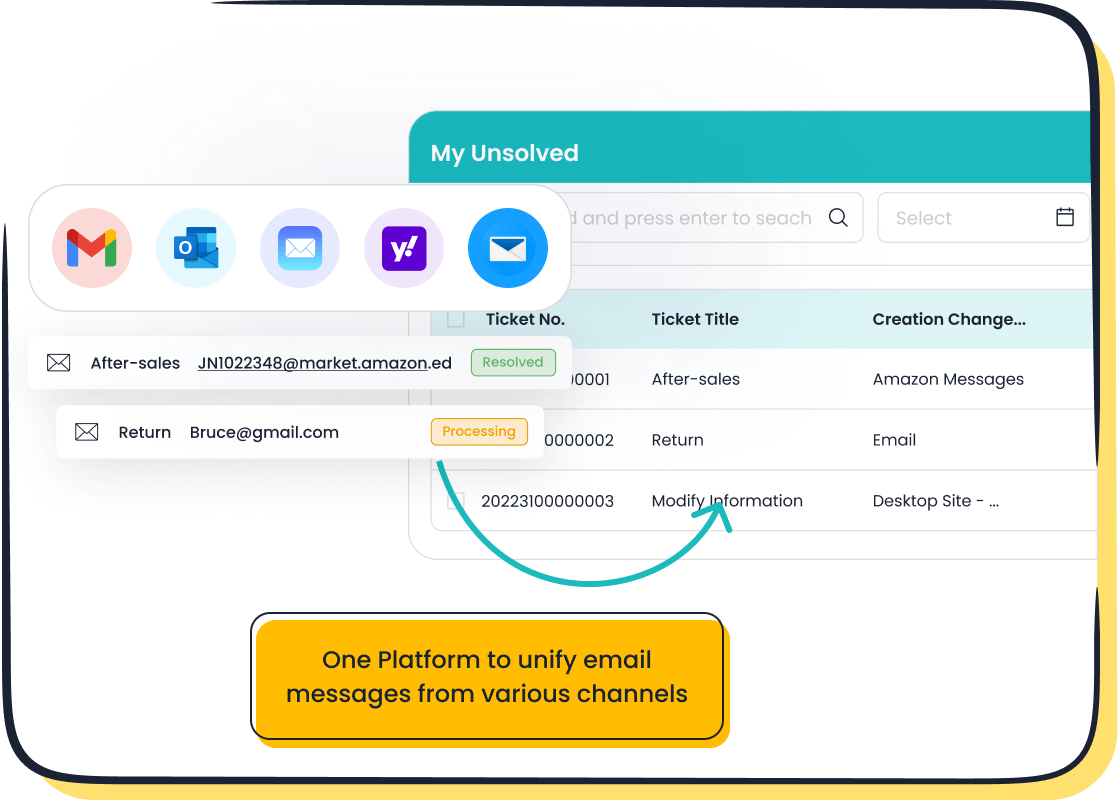
Key Features Compared
When evaluating the top help desk ticketing systems, you should focus on features that enhance efficiency and customer satisfaction. These systems often include tools that streamline ticket management and improve team collaboration. Below is a table summarizing the key features of leading ticketing software:
| Feature | Description |
|---|---|
| User-Friendly Interface | Simplifies navigation, enabling your team to resolve tickets faster. |
| Customizable Ticket Views | Lets agents prioritize tickets based on urgency or other metrics. |
| Workflow Automation | Reduces manual tasks, ensuring quicker responses to customer inquiries. |
| Collaboration Tools | Includes internal messaging and live chat for seamless teamwork. |
| Knowledge Base Integration | Provides instant access to information, improving resolution times. |
| Multi-Channel Support | Handles tickets from email, chat, and social media in one platform. |
These features make ticketing systems indispensable for modern service desk operations. They not only improve productivity but also ensure a better customer experience.
Pricing Overview
Understanding the price of ticketing software is crucial for making an informed decision. While some systems offer flexible pricing, others provide fixed plans. Here's a quick comparison of pricing and ratings for popular help desk ticketing systems:
| Ticketing System | Pricing | Gartner Rating | G2 Rating |
|---|---|---|---|
| InvGate Service Management | $17/agent/month | 4.6 | 4.7 |
| Freshservice | $19/agent/month | 4.3 | 4.6 |
| Zendesk | Not disclosed | N/A | N/A |
| ManageEngine | Not disclosed | 4.3 | 4.2 |
| SysAid | Not disclosed | 4.4 | 4.5 |
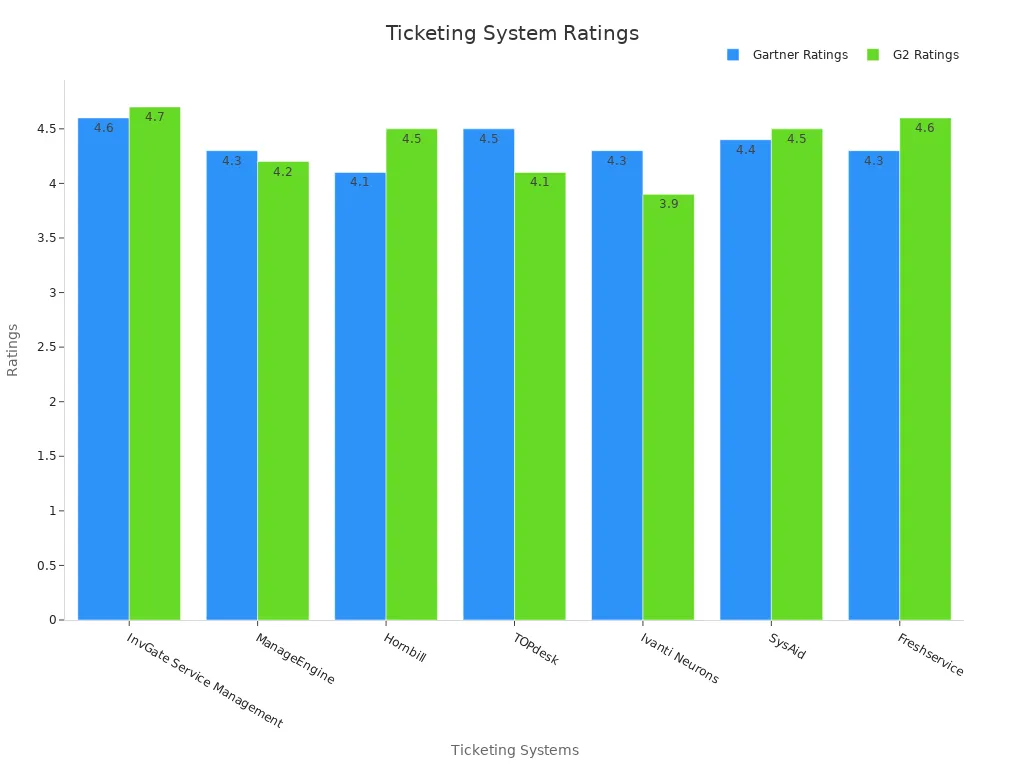
You should consider both the price and the value offered by each system. Flexible pricing options can be particularly beneficial for businesses with varying needs.
Business Suitability (Small, Medium, Large)
Ticketing systems cater to businesses of all sizes, but their suitability depends on specific needs. Here's how they align with different business categories:
- Small Businesses: Look for cost-effective ticketing software with essential features like email integration and basic automation.
- Medium Businesses: Opt for systems with advanced ticket management tools and multi-channel support to handle growing customer demands.
- Large Enterprises: Choose scalable service desk solutions with robust analytics, SLA management, and integration capabilities.
By aligning the system's features with your business size, you can ensure optimal performance and customer satisfaction.
Detailed Reviews of the Top 10 Email Ticketing Systems
Zendesk: A Leader in Customer Service Platforms
Zendesk stands out as one of the top help desk ticketing systems, offering a robust platform for managing customer interactions. Its ticketing software is designed to streamline ticket management and improve operational efficiency. You can use Zendesk to track essential metrics like response times and ticket resolution rates, which are critical for enhancing the customer experience. The platform also provides tools to measure customer satisfaction, helping you identify areas for improvement.
Did you know? 75% of consumers spend more with companies that provide excellent customer service, while 73% switch brands after bad experiences.
| Metric | Statistic |
|---|---|
| Consumers spending more with good CX | 75% |
| Consumers switching after bad experiences | 73% |
| Consumers switching after one bad experience | 50% |
Zendesk's AI capabilities make it a leader in the industry. For example, Grove Collaborative implemented Zendesk's AI features without requiring developer support. The ease of activation allowed them to enhance their ticketing processes quickly. This demonstrates how Zendesk simplifies complex tasks, making it accessible for businesses of all sizes.
Freshdesk: Popular Cloud-Based IT Ticketing System
Freshdesk is a cloud-based ticketing software that caters to businesses looking for a flexible and scalable solution. It is particularly popular among IT helpdesk teams due to its advanced automation and multi-channel support. Freshdesk allows you to manage tickets from email, chat, and social media in one unified platform, ensuring seamless service desk operations.
One of Freshdesk's standout features is its workflow automation. This tool reduces manual effort by automating repetitive tasks like ticket assignment and status updates. You can also use its collaboration tools, such as internal messaging, to improve teamwork and resolve tickets faster. These features make Freshdesk an excellent choice for businesses aiming to enhance their ticket management processes.
Freshdesk also offers a customizable interface, allowing you to tailor the platform to your specific needs. Whether you're a small business or a large enterprise, Freshdesk provides the flexibility to scale as your operations grow. Its focus on user-friendly design ensures that your team can adapt quickly, minimizing the learning curve.
Help Scout: Simplified Help Desk Solution
Help Scout is known for its simplicity and ease of use, making it a favorite among businesses that prioritize a straightforward approach to ticketing. Unlike more complex ticketing systems, Help Scout focuses on delivering a seamless customer experience. Its user-friendly interface allows your team to navigate the platform effortlessly, ensuring quick ticket resolution.
Help Scout's ticketing software integrates essential features like email ticketing and knowledge base support. These tools enable you to provide efficient customer support without overwhelming your team with unnecessary complexities. The platform also emphasizes collaboration, offering shared inboxes that allow multiple agents to work on tickets simultaneously.
Tip: If you're comparing Help Scout with other help desk ticketing systems like Freshdesk, you'll notice that Help Scout excels in simplicity. It avoids the feature-heavy design of some competitors, focusing instead on core functionalities that enhance productivity.
Help Scout is ideal for small to medium-sized businesses that need a reliable yet uncomplicated ticketing solution. Its focus on user satisfaction and streamlined operations makes it a valuable tool for improving your service desk efficiency.
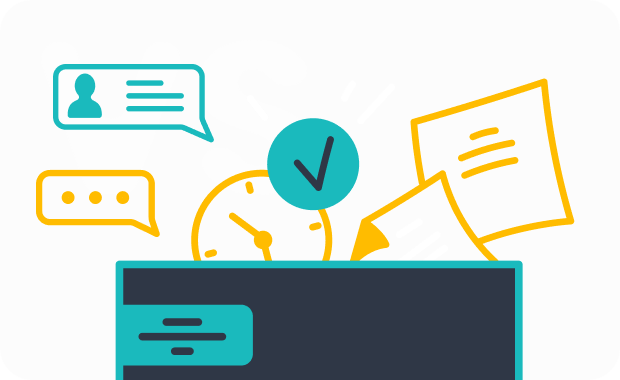
Sobot Ticketing System: Unified and Intelligent Ticket Management
The Sobot Ticketing System stands out as a powerful solution for businesses seeking unified and intelligent ticket management. Designed to streamline customer service operations, this ticketing software integrates multiple communication channels, including email, voicemail, and chat, into a single platform. This ensures that your team can manage all customer interactions efficiently without switching between tools.
One of the key strengths of the Sobot Ticketing System lies in its advanced automation capabilities. Features like workflow automation and condition-triggered flows reduce manual effort, allowing your team to focus on resolving complex issues. For example, tickets are automatically routed to the right agents based on predefined rules, ensuring faster response times. Additionally, SLA management helps you maintain high service standards by setting clear response and resolution timelines.
Did you know? Over 10,000 brands trust Sobot to improve their customer service operations. This includes enhancing Net Promoter Scores (NPS), reducing costs, and increasing efficiency.
Here’s a quick overview of the system's standout features:
| Feature | Description |
|---|---|
| Workflow Automation | Streamlines workflows and automates processes. |
| Customizable Field | Allows customization to fit specific business needs. |
| SLA Management | Helps manage service level agreements effectively. |
| Canned Replies | Provides pre-written responses to common inquiries. |
| Condition-triggered Flow | Automates ticket routing based on specific conditions. |
| Email Ticketing | Integrates email communication into the ticketing system. |
The Sobot Ticketing System also offers multilingual support, making it ideal for businesses with a global customer base. Its analytics tools provide actionable insights, helping you monitor performance and optimize operations. By adopting this ticketing software, you can significantly enhance your service desk efficiency and customer satisfaction.
Zoho Desk: Affordable and Scalable Solution
Zoho Desk is a popular choice for businesses looking for affordability and ease of use in their ticketing systems. This ticketing software offers a range of plans tailored to different business sizes, making it accessible for startups and enterprises alike. Its scalability ensures that as your business grows, the platform can adapt to your evolving needs.
Zoho Desk’s pricing structure is one of its most attractive features. Here’s a breakdown of its plans:
| Plan Type | Cost per User | Key Features |
|---|---|---|
| Free Plan | $0 | Suitable for startups and small teams |
| Standard Plan | $14 | Recommended for medium-sized businesses |
| Professional Plan | $23 | More robust productivity and collaboration tools |
| Enterprise Plan | $40 | Advanced features for large businesses |
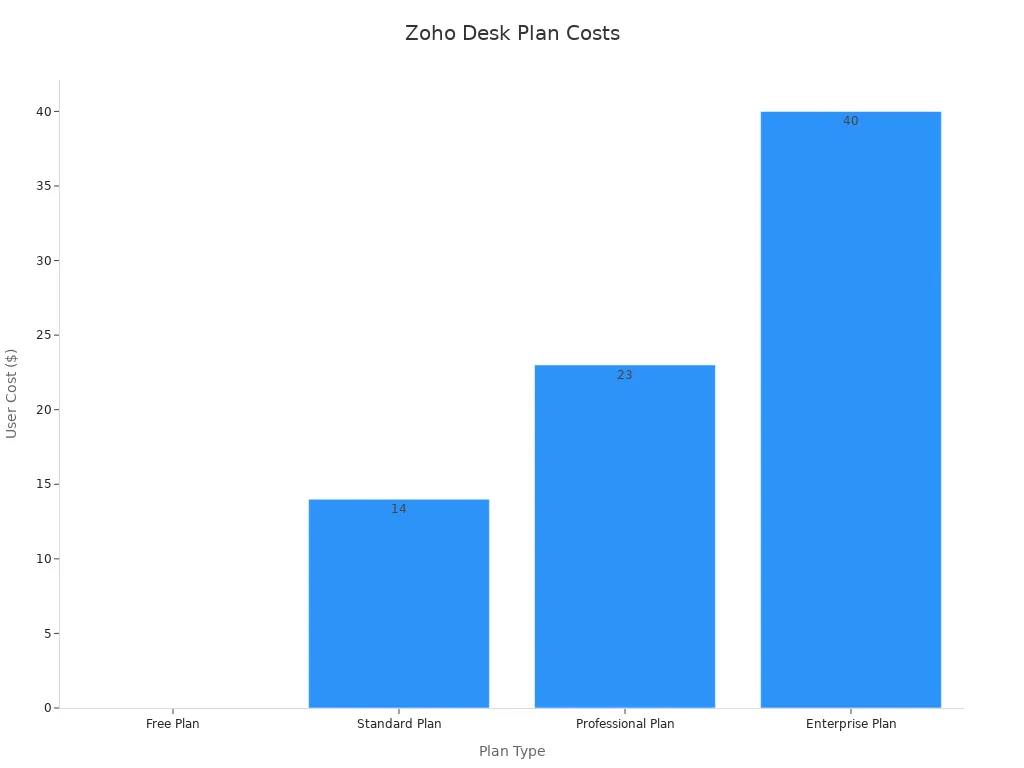
Users frequently praise Zoho Desk for its intuitive interface and robust ticket management capabilities. The platform simplifies ticket assignment and monitoring, ensuring that your team can resolve issues quickly. Many businesses also find its subscription costs lower than competitors, making it a cost-effective choice for improving service desk operations.
HubSpot Service Hub: Integrated with CRM
HubSpot Service Hub excels in providing seamless integration with its built-in CRM, making it a top help desk ticketing system for businesses that prioritize unified customer data. This ticketing software eliminates the need for separate CRM tools, simplifying your operations and ensuring data consistency across departments.
The integration of marketing, sales, and customer service functions within HubSpot’s platform creates a cohesive customer experience. All teams work with the same customer data, reducing misalignment and improving collaboration. This unified approach enhances ticket management by providing agents with a complete view of customer interactions, enabling faster and more personalized responses.
HubSpot Service Hub also supports workflow automation, which streamlines repetitive tasks like ticket assignment and follow-ups. This feature not only saves time but also ensures that no customer inquiry falls through the cracks. By combining ticketing systems with CRM capabilities, HubSpot empowers your team to deliver exceptional service while maintaining operational efficiency.
Kayako: Omnichannel Support for Small Teams
Kayako is a top choice for small teams seeking an omnichannel ticketing solution. This ticketing software integrates multiple communication channels, such as chat, email, calls, and self-service support, into a single platform. By unifying these channels, Kayako ensures that your team can manage customer interactions efficiently without switching between tools.
One of Kayako's standout features is its scalability. Whether you're a small team or planning to grow, this ticketing system adapts to your needs. It also offers a mobile app for iOS, Android, Windows Phone, and Blackberry, enabling your team to provide on-the-go support. This flexibility ensures that your customers receive timely assistance, no matter where your team is located.
Kayako's analytical tools provide valuable insights into your team's performance. These tools help you track hard-to-spot metrics, enabling you to identify areas for improvement. Additionally, Kayako is trusted by over 50,000 organizations worldwide, including notable clients like NASA and Peugeot. Its user ratings, ranging from 4.1 to 4.7 on platforms like Software Advice and G2, highlight its reliability and effectiveness.
| Feature/Aspect | Description |
|---|---|
| User Base | Trusted by over 50,000 organizations worldwide, including NASA and Peugeot. |
| Omnichannel Support | Integrates chat, ticketing, email, calls, and self-service support in one platform. |
| User Ratings | Rated between 4.1 to 4.7 on platforms like Software Advice, Capterra, and G2. |
| Mobile Accessibility | Features a mobile app for iOS, Android, Windows Phone, and Blackberry for on-the-go support. |
| Analytical Tools | Offers a full spectrum of analytical tools for tracking hard-to-spot metrics. |
| Scalability | Scalable solution that can grow with any business. |
Kayako's focus on omnichannel support and scalability makes it one of the top help desk ticketing systems for small teams. Its ability to unify communication channels and provide actionable insights ensures that your team can deliver exceptional customer service.
Jira Service Management: Ideal for IT Teams
Jira Service Management (JSM) is a leading ticketing software designed specifically for IT teams. It offers a range of features that streamline ticket management and improve operational efficiency. With tools for incident, change, and asset management, JSM ensures that your IT team can handle complex workflows with ease.
This ticketing system includes AI-powered knowledge management, which automates responses and classifies incidents. This reduces response times and enhances support efficiency. Customizable dashboards allow your team to monitor key performance indicators (KPIs) and track service performance effectively. JSM also supports native integrations and custom API connections, enabling you to enhance its functionality based on your team's needs.
- Incident Management: Tools for logging, tracking, and prioritizing incidents to minimize downtime.
- Change Management: Customizable workflows and risk assessment tools for safe change implementation.
- Asset Management: Centralized repository for tracking IT resources and dependencies.
Jira Service Management has proven its value in real-world applications. For example, the Data Systems and Services team in British Columbia upgraded to JSM to streamline their service desk operations. They reduced email back-and-forth, improved response times, and enhanced client interactions. The integration of Atlassian forms allowed them to collect dynamic data and optimize workflows, further improving service management efficiency.
JSM's robust features and real-world success stories make it an ideal choice for IT teams. Its focus on automation, customization, and integration ensures that your team can handle even the most complex IT workflows.
HappyFox: Comprehensive Help Desk Software
HappyFox is a comprehensive help desk ticketing system designed to enhance customer satisfaction and streamline ticket management. This ticketing software offers a range of features that simplify the ticketing process and improve team collaboration. Its user-friendly interface ensures that your team can navigate the platform effortlessly, reducing the learning curve.
HappyFox supports integration with popular tools like Salesforce, Microsoft Suite, and Slack, making it a versatile solution for businesses. Its multilingual agent portal and robust automation features further enhance its functionality. These tools allow your team to manage tickets efficiently and provide personalized support to customers.
| Feature | Details |
|---|---|
| G2 Rating | 4.5/5 |
| Pricing | Starts at $29/agent/month |
| Ideal Use Case | Teams prioritizing customer satisfaction |
| Security | SOC 2 Type 1 compliant |
| Integration | Salesforce, Microsoft Suite, Google Suite, Slack, HR and CRM systems |
| Features | Multilingual agent portal, Easy multi-step ticket management, Robust automation, library of free resources |
HappyFox also includes a shared inbox feature, which enhances team collaboration by ensuring that no customer query is overlooked. Its knowledge base feature allows customers to find answers independently, reducing the volume of support tickets. Additionally, its business intelligence tools provide insightful reports, helping you refine your customer service strategies.
HappyFox's focus on customer satisfaction and team collaboration makes it one of the top help desk ticketing systems. Its comprehensive features and seamless integrations ensure that your team can deliver exceptional service while improving operational efficiency.
Front: Collaborative Email Ticketing for Teams
Front stands out as a ticketing software designed to enhance team collaboration and productivity. It transforms email ticketing into a streamlined process, enabling teams to work together efficiently while maintaining a personal touch with customers. By combining shared inboxes with advanced collaboration tools, Front ensures that your team can handle customer inquiries faster and more effectively.
Key Features of Front
Front's ticketing software offers several features that make it a top choice for collaborative teams:
- Shared Inboxes: Front allows your team to manage emails collectively, ensuring no message gets overlooked. Each team member can see who is working on what, reducing duplication of effort.
- Internal Comments: Instead of forwarding emails, your team can leave internal comments directly on tickets. This feature simplifies communication and speeds up resolution times.
- Automated Workflows: Front automates repetitive tasks like ticket assignment and follow-ups, saving valuable time for your team.
- Analytics and Reporting: The platform provides detailed insights into team performance, helping you identify areas for improvement.
- Integration Capabilities: Front integrates seamlessly with tools like Slack, Salesforce, and Asana, ensuring a smooth workflow across platforms.
These features make Front an excellent choice for teams that prioritize collaboration and efficiency in their ticketing processes.
Proven Impact on Team Productivity
Front's effectiveness as a collaborative ticketing software is backed by impressive metrics. Teams using Front report significant improvements in productivity and customer satisfaction. Here’s a breakdown of the key metrics:
| Metric | Value |
|---|---|
| Hours saved per month | 300 hours |
| Reduction in email volume | 60% |
| Response time improvement | 7x faster |
| Customer satisfaction score | 97% CSAT score |
| Productivity increase | 40% |
| Training time for team | 8x faster |
| Average CSAT Score | 87% |
| Time saved per teammate | 6 hours per week |
| Faster response time | 1.5x faster |
These metrics highlight how Front not only improves operational efficiency but also enhances the overall customer experience.
Visualizing Front's Impact
To better understand Front's impact on collaboration and productivity, take a look at the following chart:
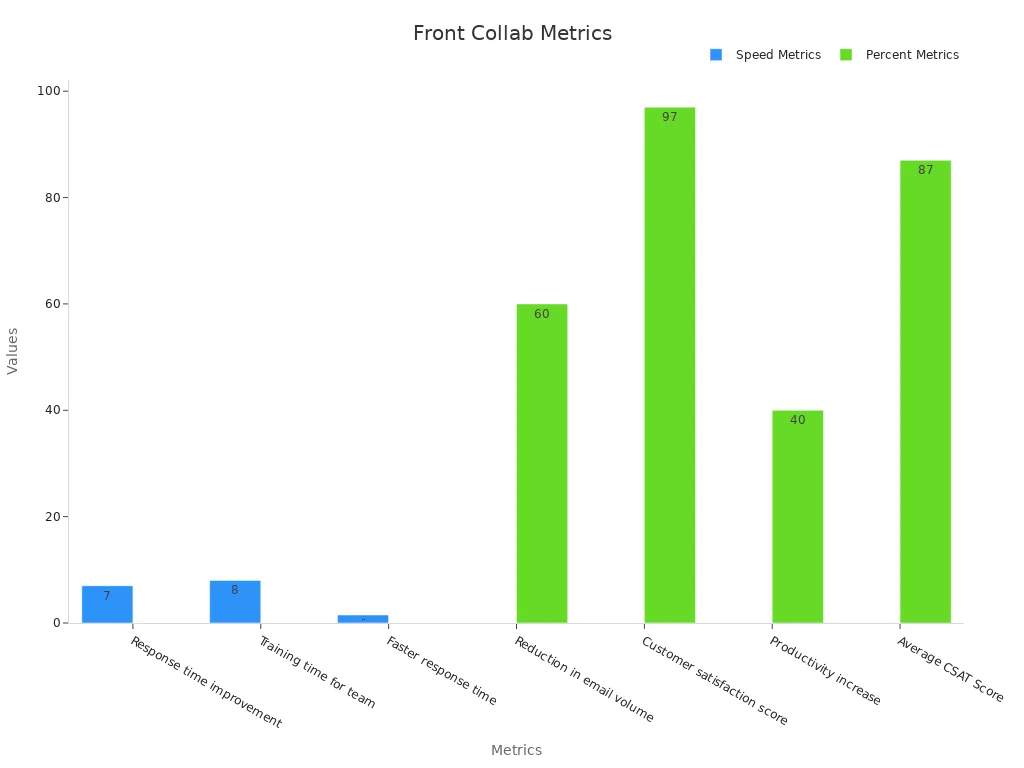
The chart illustrates how Front significantly reduces email volume, improves response times, and boosts customer satisfaction scores. These improvements demonstrate the value of adopting a collaborative ticketing system like Front.
Why Choose Front for Your Team?
Front is ideal for teams that need a collaborative approach to email ticketing. Its shared inbox feature ensures transparency, while internal comments and automated workflows simplify communication and task management. The platform’s analytics tools provide actionable insights, helping you optimize your team’s performance. With Front, you can save time, improve productivity, and deliver exceptional customer service.
If your team struggles with managing high email volumes or lacks a unified system for collaboration, Front offers a solution that addresses these challenges effectively. By adopting Front, you can transform your ticketing process into a well-organized and efficient operation.
How to Evaluate and Choose the Right Email Ticketing System
Key Features to Look For in Ticketing Software
When selecting a ticketing system, you should prioritize features that enhance efficiency and improve customer support. A user-friendly interface is essential. It allows your team to navigate the platform easily, reducing the time spent on training. Automation tools, such as workflow automation and SLA management, can streamline repetitive tasks like ticket assignment and follow-ups. These features save time and ensure faster responses to customer inquiries.
Multi-channel support is another critical feature. It enables you to manage tickets from email, chat, and social media in one place. This unified approach improves efficiency and ensures consistent customer service. Additionally, analytics tools provide valuable insights into team performance, helping you identify areas for improvement. Features like canned responses and knowledge base integration also enhance user productivity by providing quick access to pre-written solutions.
Pricing and Budget Considerations
Understanding the price of a ticketing system is crucial for making a cost-effective decision. Start by analyzing your budget and estimating both fixed and variable costs. Fixed costs include subscription fees, while variable costs depend on the number of users or ticket volume. Companies often analyze historical spending trends to forecast future expenses and maintain flexibility to accommodate unexpected costs.
Here’s a table to help you evaluate key financial questions:
| Key Questions for Managers | Learning Objectives |
|---|---|
| Will the revenue from a new grant opportunity cover the costs of expanding a program? | Define the cost objective and relevant range for the goods and services that public organizations deliver. |
| How much should we budget for a new staff member? | Contrast direct costs with indirect costs. |
| What price should we set for a new fee-based service? | Determine the full (or total) cost of a good or service. |
By addressing these questions, you can determine whether the ticketing system aligns with your financial goals. Always consider the long-term benefits, such as improved efficiency and customer satisfaction, when evaluating the price.
Scalability and Integration Capabilities
Scalability is vital for businesses planning to grow. A scalable ticketing system can handle increasing ticket volumes without performance issues. Look for systems that use cloud solutions and load balancing to ensure smooth operations. Integration capabilities are equally important. A well-integrated system connects seamlessly with tools like CRMs, e-commerce platforms, and analytics software, enhancing overall efficiency.
However, challenges like limited API rate limits and inefficient data sync methods can hinder integration. To avoid these issues, choose a system designed with scalability in mind. Best practices include asynchronous processing and real-time logging. These features ensure the system adapts to your growing needs while maintaining high performance.
User Experience and Support
A ticketing system’s user experience plays a vital role in ensuring smooth operations and customer satisfaction. When you choose a system, its ease of use directly impacts your team’s productivity and the quality of service provided to customers. A well-designed interface simplifies navigation, allowing agents to resolve tickets faster and with fewer errors.
Tip: A study by Forrester Research shows that improving user interfaces can boost conversion rates by up to 200% for websites and up to 400% for better UX design. This highlights how critical user-friendliness is for operational success.
Support features also contribute significantly to the effectiveness of a ticketing system. Systems with robust support tools, such as knowledge bases and automated workflows, help your team collaborate efficiently. These tools reduce the time spent on repetitive tasks, enabling agents to focus on resolving complex issues. For example, canned responses and ticket prioritization features ensure faster resolutions, which improve customer satisfaction.
- Key Benefits of Ticketing Systems:
- 44% of users report improved productivity.
- 35% highlight better issue tracking.
- 21% experience increased customer satisfaction.
- 78% agree that faster issue resolution is a major advantage.
A customer service ticketing system enhances efficiency and collaboration, which are essential for maintaining positive relationships with customers. By choosing a system with intuitive design and comprehensive support features, you empower your team to deliver exceptional service while reducing operational bottlenecks.
When evaluating ticketing systems, prioritize user-friendliness and support capabilities. These elements not only improve your team’s workflow but also ensure a seamless experience for your customers.
Trends in Email Ticketing Systems for 2025

Automation and AI Integration
Automation and AI are transforming ticketing systems by making customer support faster and more efficient. These technologies handle repetitive tasks like ticket assignment and response generation, freeing up your team to focus on complex issues. AI-powered tools also analyze customer inquiries to provide instant, accurate solutions. For example, Uber Freight reduced email response times by 50% and cut ticket volumes by 4% year-on-year using AI-driven workflows. Similarly, Boostability slashed response times from 10 hours to just 4 hours by automating email assignments. These advancements show how automated processes can significantly improve your service quality.
| Company | Impact Description |
|---|---|
| Uber Freight | Reduced email response times by 50% and cut ticket volumes by 4% year-on-year. |
| Structured | Achieved a 4.8 App Store rating with a single-agent team using AI-driven workflows. |
| Boostability | Slashed response times from 10 hours to just 4 hours through automated email assignments. |
By adopting AI and automation, you can enhance your ticketing system’s efficiency and deliver faster resolutions to your customers.
Cloud-Based Scalability
Cloud-based ticketing systems offer unmatched scalability, making them ideal for businesses of all sizes. These systems adjust resources based on your current needs, ensuring consistent performance without requiring infrastructure upgrades. This flexibility allows you to scale up during peak periods or scale down when demand decreases. Cloud solutions also maintain reliability, which is crucial for effective customer support. Unlike traditional on-premise systems, cloud-based platforms adapt to your business growth seamlessly. This ensures that your ticketing system remains efficient as your operations expand.
Enhanced Security Features
Modern ticketing systems prioritize security features to protect sensitive customer data. Regular security audits identify vulnerabilities and apply immediate fixes, ensuring your system stays secure. Data encryption safeguards information both in transit and at rest, while compliance support helps you meet industry-specific regulations. These strong security features build trust with your customers and protect your business from potential risks.
| Security Feature | Description |
|---|---|
| Regular Security Audits | Ongoing assessments and immediate patches for vulnerabilities. |
| Data Encryption | Ensures data is encrypted both in transit and at rest. |
| Compliance Support | Helps meet industry-specific compliance requirements with built-in features. |
By choosing a system with robust security features, you can ensure data security and maintain customer confidence.
Omnichannel Support Capabilities
Omnichannel support capabilities allow you to manage customer interactions across multiple platforms seamlessly. This approach ensures that your customers receive consistent and personalized service, no matter how they choose to connect with your business. Whether through email, chat, social media, or voice calls, omnichannel systems unify these channels into one platform, making it easier for your team to deliver exceptional support.
One of the biggest advantages of omnichannel support is its ability to boost agent productivity. By consolidating tools into a single workspace, your team spends less time switching between systems. This reduces stress and allows agents to focus on resolving customer issues efficiently. Additionally, omnichannel platforms provide enhanced analytics, giving you a complete view of customer interactions. This helps you understand customer behavior better and make data-driven decisions.
| Benefit | Description |
|---|---|
| Boosted Agent Productivity | Consolidation of tech stack saves time and reduces stress for support agents. |
| Enhanced Analytics | A holistic view of customer interactions leads to better understanding of customer behavior. |
Omnichannel support also improves customer satisfaction. Customers appreciate seamless transitions between channels, which creates a more enjoyable experience. Businesses that adopt this approach often see increased loyalty and higher retention rates. Customers are more likely to stay with a company that meets their communication preferences and provides consistent service.
| Benefit | Description |
|---|---|
| Improved Customer Satisfaction | Businesses see increased satisfaction due to seamless support across channels. |
| Increased Loyalty | Omnichannel support fosters greater customer loyalty as it meets diverse communication needs. |
| Higher Retention Rates | Companies report better retention rates as customers enjoy consistent experiences across platforms. |
Studies show that 64% of customer service agents believe a unified view of customer interactions enhances their job performance. Furthermore, 79% of organizations agree that understanding the customer journey improves customer-centricity. These insights highlight the importance of omnichannel systems in creating a customer-focused support strategy.
By adopting omnichannel support, you can streamline operations, improve customer satisfaction, and build stronger relationships with your audience. This capability ensures that your business stays competitive in an increasingly connected world.
Common Mistakes to Avoid When Selecting an Email Ticketing System
Overlooking Scalability for Future Growth
Failing to consider scalability can limit your ticketing system’s ability to grow with your business. As your customer base expands, the volume of tickets will increase. A system that cannot handle this growth may lead to delays and inefficiencies. To avoid this, choose a platform that supports auto-scaling and integrates seamlessly with your existing tools. For example:
- A scalable system should adapt to trends like digital ticketing without disruptions.
- Enhancements, such as new features or integrations, should be implemented smoothly.
- Platforms like AWS or Azure offer robust scalability for growing businesses.
| Best Practice | Description |
|---|---|
| Select a scalable platform | Choose platforms like AWS, GCP, or Azure that can handle increasing ticket volumes. |
| Ensure auto-scaling capabilities | The system should automatically adjust resources based on demand. |
| Integration with existing systems | The ticketing system must work well with your current infrastructure. |
By prioritizing scalability, you ensure your system remains efficient as your business grows.
Ignoring Integration with Existing Tools
A ticketing system that doesn’t integrate with your current tools can disrupt workflows. Integration ensures smooth communication between platforms, reducing manual work and errors. For instance, if your CRM and ticketing system don’t sync, agents may lack critical customer information. This can lead to slower resolutions and frustrated customers.
When evaluating systems, check their compatibility with tools like e-commerce platforms, analytics software, and communication apps. A well-integrated system saves time and improves efficiency. It also allows your team to focus on delivering excellent customer service instead of managing disconnected tools.
Choosing Based Solely on Price
Selecting a ticketing system based only on price can lead to long-term challenges. While affordability is important, a low-cost system may lack essential features like automation or analytics. These omissions can reduce efficiency and increase operational costs over time.
Instead of focusing solely on price, evaluate the value a system offers. Consider its features, scalability, and integration capabilities. A slightly higher upfront cost may save you money in the long run by improving productivity and customer satisfaction. Always balance cost with the system’s ability to meet your business needs.
Neglecting User Training and Support
When adopting a new email ticketing system, skipping user training and support can lead to inefficiencies and frustration. Even the most advanced software becomes ineffective if your team doesn’t know how to use it properly. Training ensures that your staff understands the system’s features and can use them to their full potential.
Tip: A well-trained team resolves tickets faster and delivers better customer experiences.
Here’s why training and support are essential:
- Boosts Confidence: Training helps your team feel comfortable with the system. Confident agents work more efficiently and make fewer errors.
- Reduces Downtime: Without proper training, your team may struggle to navigate the system. This slows down ticket resolution and impacts customer satisfaction.
- Maximizes ROI: You’ve invested in a ticketing system. Training ensures you get the most out of its features, increasing your return on investment.
To avoid neglecting training, follow these steps:
- Provide Onboarding Sessions: Introduce the system with hands-on training. Cover basic and advanced features to ensure everyone is on the same page.
- Create a Knowledge Base: Offer guides, FAQs, and video tutorials. These resources help your team troubleshoot issues independently.
- Offer Ongoing Support: Regularly update your team on new features or changes. Provide access to a support team for immediate assistance.
Did you know? Companies that invest in employee training see a 24% increase in productivity.
By prioritizing training and support, you empower your team to use the ticketing system effectively. This leads to faster resolutions, happier customers, and a more efficient workflow. Don’t let a lack of training hold your business back. Equip your team with the knowledge they need to succeed.
Choosing the right email ticket system transforms your customer service operations. It improves efficiency, enhances customer satisfaction, and simplifies workflows. Small businesses benefit from cost-effective systems with essential features. Medium-sized businesses thrive with tools that handle growing demands. Large enterprises need scalable solutions with advanced analytics. To select the best system, focus on automation, multi-channel support, and user-friendly design. Evaluate your business needs carefully and prioritize systems that align with your goals.
FAQ
What is an email ticketing system, and why do you need one?
An email ticketing system organizes customer inquiries into tickets for easy tracking and resolution. It helps you streamline communication, improve response times, and enhance customer satisfaction. Businesses use it to manage high volumes of emails efficiently while maintaining service quality.
How does automation improve ticketing systems?
Automation reduces manual tasks like ticket assignment and follow-ups. It ensures faster responses and minimizes errors. For example, automated workflows can route tickets to the right agent based on predefined rules, saving time and improving efficiency.
Tip: Automation also helps maintain consistency in customer service.
Can small businesses benefit from ticketing systems?
Yes, small businesses gain significant advantages. Ticketing systems provide essential features like email integration and basic automation. These tools help you manage customer inquiries efficiently without requiring a large team or budget.
What features should you prioritize when choosing a ticketing system?
Focus on features like multi-channel support, workflow automation, and SLA management. These tools improve efficiency and ensure faster ticket resolution. A user-friendly interface and analytics capabilities also help you monitor performance and optimize operations.
Are ticketing systems secure?
Modern ticketing systems prioritize security with features like data encryption and regular audits. These measures protect sensitive customer information and ensure compliance with industry regulations. Choosing a system with robust security features builds trust and safeguards your business.
Note: Always verify a system’s security certifications before implementation.
See Also
Best Customer Service Tools You Need in 2024
Comprehensive Reviews of Contact Center Solutions for 2024
Leading Cloud Contact Center Solutions to Explore in 2024
